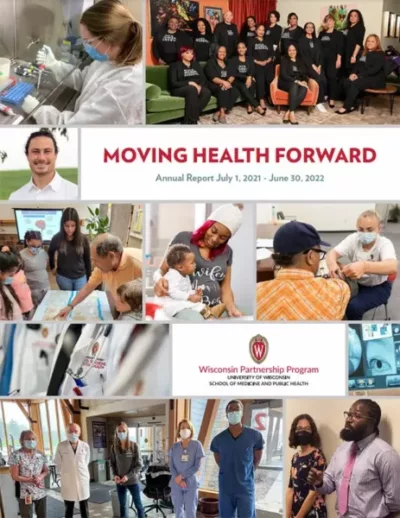2021-22 Annual Report: Moving Health Forward
This year’s annual report highlights how the Wisconsin Partnership Program is moving health forward through a wide range of projects and partnerships that are working to improve health and advance health equity across the state.
 The annual report provides an account of grantmaking, program activities, and a financial overview for the period of July 1, 2021 through June 30, 2022.
The annual report provides an account of grantmaking, program activities, and a financial overview for the period of July 1, 2021 through June 30, 2022.
The Wisconsin Partnership Program advances its mission to improve health and advance health equity through a strong portfolio of grant programs that propel medical research, enhance health education and workforce development, support community health partnerships, advance health equity and respond to the COVID-19 pandemic.
During fiscal year 2021–22, the Wisconsin Partnership Program awarded 41 new grants, supporting in total 124 active projects and initiatives.
This year’s annual report highlights how the Wisconsin Partnership Program is moving health forward through a wide range of projects and partnerships that are working to improve health and advance health equity across the state
Fiscal Year 2021-22 Grants
Grants Awarded
Dollars Awarded
Total Active Grants
Dean Golden's Message
 Robert N. Golden, Dean, University of Wisconsin School of Medicine and Public Health
Robert N. Golden, Dean, University of Wisconsin School of Medicine and Public Health
It is my pleasure to present the Wisconsin Partnership Program’s annual report for fiscal year 2021–2022. The UW School of Medicine and Public Health is proud to serve as the home to the Wisconsin Partnership Program. Established through a gift resulting from Blue Cross Blue Shield United of Wisconsin’s conversion from a nonprofit organization to a for-profit corporation, the Wisconsin Partnership Program endowment has provided an unprecedented opportunity to improve health and advance health equity throughout our state.
This year, we welcomed Amy Kind, MD, PhD, associate dean for social health sciences and programs and professor of medicine at the UW School of Medicine and Public Health as the Partnership Program’s executive director. She follows Eileen Smith, founding director, who retired after nearly 20 years of outstanding leadership and dedicated service to the Wisconsin Partnership Program. Dr. Kind has served on the Wisconsin Partnership Program’s governance committees since 2018. She is the director of the UW Center for Health Disparities Research and an international leader in the fields of social determinants, health equity, and brain health disparities research. Her rigorous research expertise and commitment to health equity will greatly inform and guide the work of the Wisconsin Partnership Program.
Since it began making grants in 2004, the Wisconsin Partnership Program has remained a steadfast partner to researchers, health care providers, educators, and community organizations who are working tirelessly to improve the health of Wisconsin’s people and communities. To date, this has resulted in 591 grants for a diverse array of initiatives whose impact extends to the corners of our state and beyond—a true embodiment of the Wisconsin Idea. Through these investments and partnerships, the Wisconsin Partnership Program is driving research and discovery, enhancing education, tackling health inequities, responding to a pandemic, and supporting solutions to complex health challenges. The advancements and interventions resulting from this work will benefit the people of Wisconsin now and for years to come.
This annual report highlights several partnerships that span a broad range of health issues, geographic areas, communities, and populations. Our state is stronger and our communities are healthier as a result of these powerful collaborations. The Wisconsin Partnership Program remains dedicated to advancing the Wisconsin Idea in a way that allows everyone in our state to live full and healthy lives.
Sincerely,
Robert N. Golden, MD
Robert Turell Professor in Medical Leadership
Dean, UW School of Medicine and Public Health
Vice Chancellor of Medical Affairs
University of Wisconsin–Madison
Dr. Amy Kind’s Message
 Thank you for your ongoing support and interest in the critical work that the Wisconsin Partnership Program and its partners are undertaking to improve the health and well-being of the people of Wisconsin. As we continue to navigate the ongoing COVID-19 pandemic and address the health disparities facing communities across the state, the Wisconsin Partnership Program’s work remains more important than ever.
Thank you for your ongoing support and interest in the critical work that the Wisconsin Partnership Program and its partners are undertaking to improve the health and well-being of the people of Wisconsin. As we continue to navigate the ongoing COVID-19 pandemic and address the health disparities facing communities across the state, the Wisconsin Partnership Program’s work remains more important than ever.
The University of Wisconsin School of Medicine and Public Health and Wisconsin Partnership Program share a vision of improving health and advancing health equity for all. We are working with partners within the university and in communities throughout the state to develop new opportunities for innovation and collaboration—through investments in basic science, clinical and translational research, education, and community partnerships—that will bring us closer to realizing this vision.
The Wisconsin Partnership Program also recognizes that fully achieving this vision will take the commitment and work of many collaborations across many sectors. As such, we look forward to future opportunities to convene a broad range of partners and stakeholders as we explore new ideas, interventions, and impactful solutions for addressing the persistent health challenges facing our state. This year I was honored to assume the role of Executive Director of the Wisconsin Partnership
Program and build upon its legacy of impact and success. As both a medical doctor specialized in the treatment of memory disorders and a clinical researcher with expertise in neighborhood disadvantage, social determinants, and brain health, I have dedicated my career to better understanding and eliminating health disparities. I look forward to partnering with the many collaborators and stakeholders who are striving to ensure that our shared vision of improved health and advanced health equity reaches every corner of Wisconsin. Together, we will create pathways that move health forward.
Fiscal Year 2022 Grants Awarded
Education and Research Grant Programs
- 3 Collaborative Health Sciences Grant Program Grants
$1.8 million awarded - 4 New Investigator Grant Program Grants
$600,000 awarded - 6 Strategic Education and Research Grants
$7.4 million awarded - 8 COVID-19 Response Partnership Education and Research Grants
$1.9 million awarded
Community Grant Programs
- 4 Community Impact Grants
$4 million awarded - Child Health Grants
$1.16 million awarded - 8 COVID-19 Focus on Adolescent Social and Emotional Health Grants
$1.6 million awarded
Evaluation
The Wisconsin Partnership Program (WPP) works continuously to enhance its evaluation strategies. These efforts allow the WPP to better understand the broad impact of its funding while simultaneously empowering grantees to understand how their work influences individual, community, and population health throughout Wisconsin. During this past year, the Wisconsin Partnership Program initiated several new evaluation activities and enhancements, including:
- Refining procedures for collecting data
- Building the evaluation capacity of grantees
- Designing a roadmap for future evaluation efforts
Evaluation Planning
The Wisconsin Partnership Program has created a new roadmap for evaluating its impact as a community grants funder. Developed with input from a wide variety of WPP stakeholders, this evaluation plan is the culmination of more than two years of work and generates a wide range of data. The Wisconsin Partnership Program will use seven primary methods of data collection to answer evaluation questions including:
- Data collected by WPP staff from grantee applications
- Assessments conducted on WPP-led trainings and workshops
- Grantee surveys designed to understand WPP interactions with grantees as well as gauge long-term impacts of WPP funding support
- Standardized grantee reporting included i n annual progress reports
- WPP internal staff interviews and focus groups
- Grantee interviews and focus groups
- Community stakeholder interviews and secondary sources such as local, county, and state level public health data
Evaluation Capacity Building
One of the primary goals of the current Wisconsin Partnership Program five-year plan is to build community organization (grantee) capacity and leadership. Over the last year, evaluation staff have implemented tailored programming and evaluation support that enables grantees to cultivate and build capacity within evaluation-specific skills and operations. WPP staff led evaluation learning sessions, held open office hours for community grantees, conducted evaluation needs assessments for all new Maternal and Child Health Program grantees, and provided ad hoc evaluation and application support when requested. Grantees will use the knowledge gained to evaluate their own programs more effectively, which will in turn be beneficial for future funding applications, disseminating best practices, and efforts to grow their work within the state of Wisconsin.
Outcome Highlights
Grantees continue to demonstrate success and impact across a wide variety of domains. The Wisconsin Partnership Program publishes outcome reports of grants that concluded during the fiscal year. These reports highlight achievements, progress toward health improvement, knowledge gained, and impact. They can be found on our Funded Projects page.
Articles, presentations, and other media sharing the findings of WPP projects
Leveraged in funding derived from WPP-funded projects
Unique collaborations funded by WPP grants
*Data from July 1, 2021 – June 30, 2022
Financial Overview
These financial reports consolidate activities of the Wisconsin Foundation and Alumni Association and the School of Medicine and Public Health for the fiscal year ending June 2022 and June 2021.
Net Assets
| Type | Description | Year Ending June 30, 2022 | Year Ending June 30, 2021 |
|---|---|---|---|
| Assets | UW SMPH Cash | -$1,327,208 | -$1,427,585 |
| Current Investments | $15,923,705 | $18,454,334 | |
| Noncurrent Investments | $367,959,583 | $432,483,727 | |
| Total Assets | $382,556,080 | $449,510,476 | |
| Liabilities | OAC Grants Payable | $21,624,902 | $20,814,940 |
| PERC Grants Payable | $17,522,598 | $16,065,329 | |
| Total Liabilities | $39,147,500 | $36,880,269 | |
| Net Assets | Temporarily Restricted | $59,792,313 | $129,013,940 |
| Permanently Restricted | $283,616,267 | $283,616,267 | |
| Total Net Assets | $343,408,580 | $412,630,207 | |
| Total Liabilities and Net Assets | $382,556,080 | $449,510,476 |
Revenues, Expenses, Changes in Net Assets
| Type | Description | Year Ending June 30, 2022 | Year Ending June 30, 2021 |
|---|---|---|---|
| Revenues | Gifts Received | $ - | $2,325 |
| Interest Income | $7,871 | $23,990 | |
| Change in Fair Value of Endowed Funds | -$46,039,073 | $98,906,013 | |
| Total Revenues | -$46,031,202 | $98,932,328 | |
| Expenses | WFAA Institutional Advancement Fee | $4,336,524 | $3,841,245 |
| Less: WFAA IAF Rebate | -$550,957 | -$402,374 | |
| Administrative Expenses | $1,344,483 | $1,476,963 | |
| OAC Grant Expenses | $6,727,502 | $5,638,467 | |
| PERC Grant Expenses | $11,332,873 | $2,658,679 | |
| Total Expenses | $23,190,425 | $13,212,980 | |
| Increase/(Decrease) in Net Assets | -$69,221,627 | $85,719,348 | |
| Net Assets - Beginning of year | $412,630,207 | $326,910,859 | |
| Net Assets - End of year | $343,408,580 | $412,630,207 |
Grant Award Commitments FY 2022
| Type | Description | Net Grant Awards(1) | Inception to Date Disbursements | Outstanding Grant Commitments |
|---|---|---|---|---|
| Public Health Initiatives | Grants Awarded from Inception to FY2021 | $93,896,708 | $78,771,021 | $15,125,687 |
| FY2022 Awards | $6,837,776 | $338,561 | $6,499,215 | |
| Subtotal | $100,734,484 | $79,109,582 | $21,624,902 | |
| Medical Education and Research Initiatives | Grants Awarded from Inception to FY2021 | $161,086,411 | $154,697,067 | $6,389,344 |
| FY2022 Awards | $11,651,438 | $518,184 | $11,133,254 | |
| Subtotal | $172,737,849 | $155,215,251 | $17,522,598 | |
| Total | $273,472,333 | $234,324,833 | $39,147,500 |
Cash Receipts and Disbursements
| Type | Description | FY2022 | FY2021 |
|---|---|---|---|
| Balance, July 1 | -$1,427,585 | -$1,545,561 | |
| Cash Receipts | Payments received from the UW Foundation | $17,238,003 | $16,706,384 |
| Total Receipts | $17,238,003 | $16,706,384 | |
| Cash Disbursements | Public Health Initiatives | $5,917,540 | $6,358,053 |
| Education and Research Initiatives | $9,875,603 | $8,753,392 | |
| Program Administration | Salaries | $803,029 | $761,099 |
| Fringe | $278,274 | $273,547 | |
| Travel | $100 | $139 | |
| Supplies and Services | $64,773 | $125,145 | |
| Consultants and Contracts | $186,307 | $305,033 | |
| Other Disbursements | $12,000 | $12,000 | |
| Total Program Administration | $1,344,483 | $1,476,963 | |
| Total Disbursements | $17,137,626 | $16,588,408 | |
| Increase (Decrease) In Balance | $100,377 | $117,976 | |
| Balance, June 30 | -$1,327,208 | -$1,427,585 |
Selected Grant Highlights
The work of the Wisconsin Partnership Program and its grantees touches all corners of the state, across a wide range of health challenges, communities, populations and geographic areas. Learn how Wisconsin Partnership Program grantees are positively impacting health and advancing health equity across our state through these selected examples.
- Addressing Covid-19’s Ongoing Health Consequences and Its Impact on the Social and Emotional Health of Our State’s Youth
- Addressing Dual Epidemics of Drug Overdose and COVID-19
- Bolstering the Health Care Workforce by Helping Students
- Developing Public Health Leaders To Serve Wisconsin
- Harnessing the Power of Partnerships With the Foundation for Black Women’s Wellness
- Improving Dementia Care and Treatment for the Latino Community
- Increasing Access to Treatment and Care for People Struggling With Substance Use Disorders in Rural Wisconsin
- Preventing Stroke in the Oneida Nation
- Promoting Food Sovereignty and Cultural Identity in the Oneida Nation
- Shedding Light on COVID-19’s Impact on Wisconsin’s Disability Community
- Supporting Community-led Approaches To Improving Maternal and Infant Health Outcomes
Reporting Outcomes and Impact
The Wisconsin Partnership Program publishes outcome reports for concluded grants to highlight the progress, achievements and impact of our grant partners.
View our Funded Projects page for information about grants awarded in fiscal year 2021-2022, active grants and outcome reports.